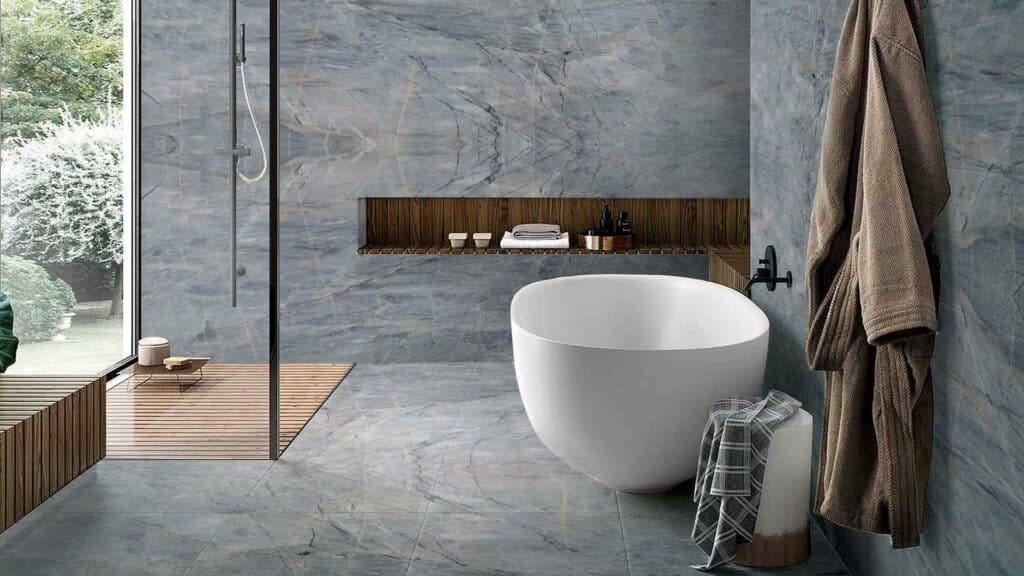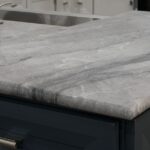Quartzite bathroom countertops are becoming more and more popular with each passing day – one would even say marble and granite are no match for this beautiful natural stone. All of them are gorgeous and cost-beneficial, but quartzite is a public favorite for a reason, ranging from compact vanities to whole shower walls. There are several reasons for that, actually, as we’ll see in this article.
Keep reading to find out the details behind this investment! Or, if you’d like to check on their average price instead, click here.
What are quartzite bathroom countertops?
Quartzite countertops are made from a metamorphic rock called quartzite, which is used for many styles of bathroom design across the world. Quartzite is formed when sandstone undergoes a process of heat and pressure deep within the Earth’s crust, causing it to recrystallize and become much harder and more durable than its parent rock, sandstone.
While primarily composed of quartz – a mineral made up of silicon and oxygen atoms (SiO2) – the transformation from sandstone to quartzite occurs when the individual quartz grains in the sandstone recrystallize and fuse. This process creates a very hard, durable, and porous rock with a granular texture.
Bathroom quartzite countertops are highly prized for their durability, beauty, and resistance to heat and scratching, making them a popular surface to withstand daily activities. Besides, quartzite slabs often come in various colors, patterns, and veining, adding a touch of elegance to the space while offering practical benefits due to their robust nature. They can be polished to a glossy finish or left with a more natural texture, depending on personal preferences and design aesthetics.

Before making any permanent decisions, just be aware that quartzite countertops need to be sealed, which is a big factor in your eventual maintenance routine. Quartzite is a porous natural stone – just like granite and marble – and to avoid major water stains and cracking, a sealer must be applied to its surface at least once a year. Read all about sealing quartzite in this detailed tutorial.
Benefits of installing a quartzite countertop in the bathroom
Why invest in quartzite in the first place, though? Well, hear this: in the long run, even when you’re moving out of the house, the durability and aesthetic appeal of quartzite countertops can enhance the overall resale value, making it an attractive option for homeowners looking to invest in long-lasting, beautiful materials.
Other benefits of choosing this stone over its cousins (a.k.a granite and marble) include:
- Durability: Quartzite is highly durable and resistant to scratches and chipping. In a bathroom setting where various products and items are used daily, this durability can be invaluable. Its heat resistance is particularly advantageous where hot styling tools might be used – and it is also relatively resistant to stains when properly sealed, making it easier to maintain and clean.
- Aesthetic appeal: Quartzite countertops come in a variety of colors and patterns, often resembling the look of marble with unique veining (and lesser cost). This adds elegance and sophistication to the bathroom space.
- Low maintenance: Once sealed properly, quartzite countertops require minimal maintenance compared to other natural stones. Regular cleaning with mild soap and water is usually sufficient – read all about this delicate topic by clicking here.
- Versatility: Quartzite’s versatility allows it to complement various design styles, from modern to traditional, making it a versatile choice for different bathroom aesthetics.
The difference between quartzite and quartz
This is a common question faced by many in their search for the ideal natural stone. After all, sometimes they all look the same – so when their names are also similar, their individualities might get mixed up, affecting your choice.
Well, the main difference here is simple: quartzite is natural, whereas quartz is a manmade product that comes from quartzite. Quartz countertops are engineered stone surfaces made primarily of quartz crystals (typically around 90-95%) bound together with resins and pigments. In other words, they are manufactured in a controlled environment, while quartzite is collected from natural quarries.
The primary thing to consider, then, lies in their composition, formation, and versatility. Quartz is non-porous – meaning it doesn’t have to be sealed like quartzite – and can be found in a vast array of colors on the market. That said, each has its own set of advantages and considerations, so the choice between them often depends on personal preferences, budget, and specific application requirements.
Don’t miss: A Complete Guide to Quartzite Countertop Sealers
Contact Eagle Stones to see our top selection of quartzite slabs!
If you live near Sarasota, Florida, we have the right catalog of quartzite countertops for you. We work with a variety of natural stones from all over the world – including granite, marble, onyx, and quartzite. We can even go to your home to give you a free estimate!
Get in contact with our team to start planning your next project today!



